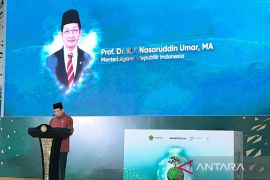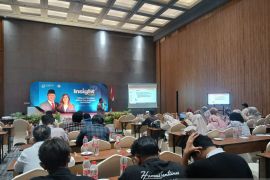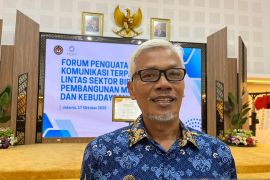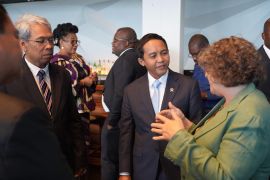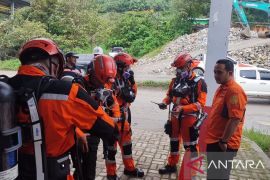Public awareness must also be raised to curb illicit trade involving wild animals and their products which is currently the worlds fifth largest business with a turnover of US$19 billion each year.
Indonesia, according to ProFauna, is rich in biodiversity with more than 300 thousand wildlife species or 17 percent of those in the world.
Besides, the country also becomes the habitat of endemic wildlife, and most of them in Indonesia are found nowhere else around the world.
According to the International Union for Conservation of Nature and Natural Resources (IUCN), there are 259 endemic mammals, 282 endemic birds, and 172 endemic amphibians.
Despite rich in biodiversity, Indonesia is also notorious as a country which has long list of the threatened wildlife, and the threatened wildlife in the country in 2011 included 184 mammals, 119 birds, 32 reptiles, 32 amphibians, and 140 fish.
There are 68 species which are critically endangered and 69 endangered species, and 517 vulnerable species. These wildlife will be eventually extinct if there is no action to save them from extinction.
In 2015 the Environmental Affairs and Forestry Ministry handled 27 cases of protected wildlife-related crimes, mostly involving mammals.
Of the 27 cases, 14 cases involved mammals, two birds, two primates, four fishes, four reptiles, and one flora, according to the ministrys Director General for Law Enforcement, Rasio Ridho Sani.
Forest is the natural habitat for the wildlife but the main factor of threatened wildlife in Indonesia is deforestation, making the forest in the country is now less than 120 million hectares.
Forest conversion into palm oil plantation, industrial production forest, and mine becomes serious threat towards the survival of rare wildlife including orangutan, Sumatran tiger, and Sumatran elephant.
Wildlife poaching happens due to forest clearance. Wildlife are considered as pests by the plantation companies causing wildlife killing in the plantation areas.
Apart from habitat degradation in both quality and quantity, wildlife trade becomes another threat to wildlife in Indonesia, and more than 95 percent of the traded wildlife in the markets are wild caught instead of captive bred.
According to ProFauna, more than 40 percent of the traded wildlife die in vain due to inappropriate transportation and handling, cruel capture, small cages, and lack of food.
In mid 2015 the Indonesia Environmental Affairs and Forestry Ministry seized tens of yellow-crested cockatoo (Cacatua sulphurea) at Tanjung Perak seaport in Surabaya, East Java.
The protected birds were smuggled via a passenger ship Tidar serving Papua, Ambon, Makassar, Surabaya, and Jakarta route.
The endangered yellow-crested cockatoos were found stuffed into empty 1.5-liter mineral water bottles and were in a poor condition.
Yellow-crested cockatoo has been listed as an endangered species since 2007.
It is estimated that only seven thousand yellow-crested cockatoos exist in the world.
According to the Law No. 5/1990 concerning the Conservation of the Natural Resources and the Ecosystem, the trade of the protected wildlife is illegal and liable to a maximum of five year prison term and a 100 millions Indonesia Rupiah fine.
However, the law is now considered outdated and unable to stop rampant illegal wildlife hunting and trading, and therefore it needs to be revised immediately.
WWF Indonesia Conservation Director Arnol Sitompul has opined that the revision of the law is very urgent in order to rescue the remaining protected wildlife.
In a discussion on Thursday on "Stop and Report the Illegal Trade of Protected Wildlife" to mark the World Environment Day on June 5, Sitompul remarked that the revision of the law was being discussed by the government and the House of Representatives.
Every June 5 since 1973, the World Environment Day has been celebrated to raise the global awareness about the importance of the healthy and green environment in the human lives.
Therefore, the WWF welcomed and supported the National Movement for Wildlife Protection, declared by President Joko Widodo (Jokowi) in Kepulauan Seribu (Thousand Islands) last April.
According to Sitompul, the derivative of the Law No.5/1990 which lists endangered wildlife has been urgent to be revised, given that many many wildlife species that are now classified as endangered are not included in the list.
The UN Environment Program (UNEP) has said action is urgently needed to curb the situation, including strengthening law enforcement, building adequate human and financial capacity, raising public awareness, and fighting collusive corruption, as well as supporting national legislation and curbing demand for wildlife products.
It also called for longer-term considerations on natural resource management and sustainable economic development.
The UNEP also sees the importance of raising the ordinary peoples awareness, something that requires not only legislation but also security interventions.
UNEP also needs people to know that when they buy a piece of ivory that is illegally traded, they are directly contributing to threatening the survival of that species.(*)
Reporter: Otniel Tamindael
Editor: Heru Purwanto
Copyright © ANTARA 2016
